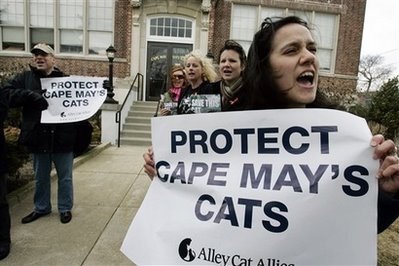
CAPE MAY, N.J. - Having learned a lesson about the birds and the beach, this Victorian seaside resort adopted a compromise plan Tuesday to protect both by keeping cats away from them.
After nearly a year of conflict that pitted cat lovers against bird lovers in one of North America's prime bird-watching spots, the City Council approved a plan to move feral cat colonies 1,000 feet away from the beach.
The move was necessary to protect endangered shore birds like the piping plover and the least tern, both of which are vulnerable to cats and other predators because they nest on the ground, in ruts on Cape May's popular beach.
Because the birds are listed as endangered species, federal environmental officials had threatened to withhold funds for replenishing Cape May's beach if the city refused to protect the birds.
"It's important to protect our beaches," said Councilwoman Linda Steenrod. "At the same time, it's important to protect life. That means all life. I think we have a good compromise."
About 40 cat lovers picketed outside City Hall before Tuesday's vote, chanting "Feral cats won't go away, revise the plan and let them stay."
The U.S. Fish and Wildlife Service had wanted feral cat colonies banned within one mile of the beach — which would have eliminated all wild cats in Cape May, where both cats and birds are popular.
The compromise calls for a 1,000-foot buffer zone between the cats and known bird nesting grounds.
The federal Endangered Species Act prohibits killing, harming or even bothering endangered birds like piping plovers and least terns. Nesting areas are closed during the breeding season.
The city will continue its trap, neuter and release program, which has reduced Cape May's wild cat population from 450 to about 100 over the past decade, but now it will release the animals outside the buffer zone.
Becky Robinson, president of Alley Cat Allies, a national cat advocacy group based in Maryland, said Cape May's cat control program is a worldwide model.
"To hold beach replenishment money over the heads of a city that has done everything right is simply misguided," she said.
Deputy Mayor Neils Favre received 600 e-mails against the cat relocation plan on a single day last month. He said the compromise leaves the door open for either the city or federal or state wildlife officials to revisit the plan if it needs to be changed.
Federal authorities have said they are not thrilled with the compromise, believing it still allows wild cats too close to nesting birds, but are willing to try it for a few months this spring and summer.
Melissa Holroyd, who has trapped 53 wild cats since November and paid to have them neutered, said the compromise is a good one.
"This is such an emotional issue here," she said. "I can feel my heart racing right now, but continuing to trap, neuter and release is a step in the right direction."
 RSS
RSS

0 Comments:
Post a Comment
<< Home